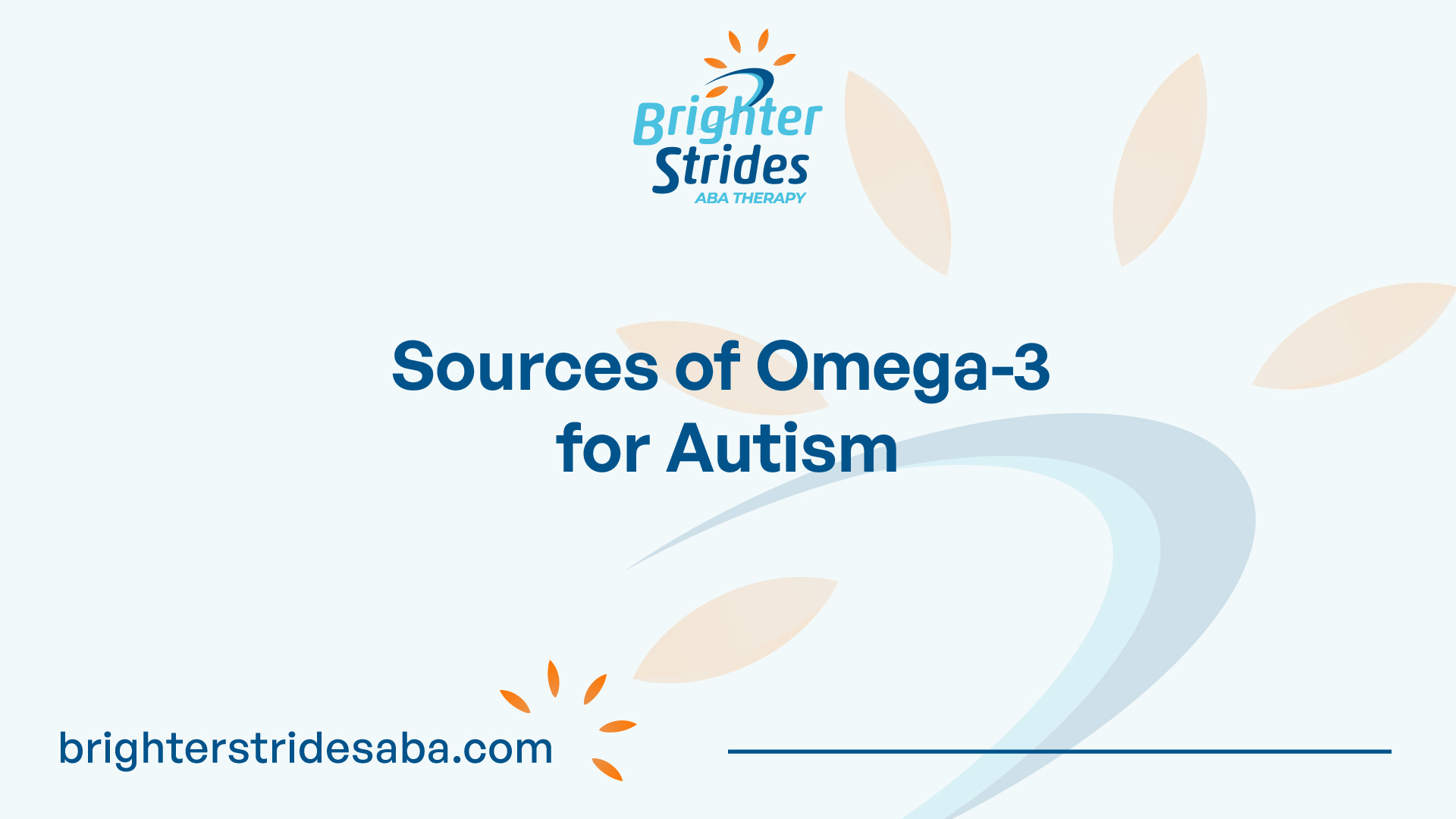Understanding Omega-3 for Autism
When exploring the potential nutritional interventions for autism, understanding the role of omega-3 fatty acids is essential. Omega-3s are a type of polyunsaturated fatty acids that have been linked to various health benefits, including brain function and development. In the context of autism, research has indicated that individuals with autism often have lower levels of omega-3s in their bodies compared to the general population.
Read about: Unveiling Effective Supplements and Vitamins for Autism

Importance of Omega-3 Fatty Acids
Omega-3 fatty acids play a crucial role in brain function and development. The brain is composed of approximately 60% fat, emphasizing the significance of fats for optimal brain health [1]. Numerous studies have shown the impact of fish oil, which is rich in omega-3s, on brain function and development, making it particularly relevant for individuals with autism.
Research has also suggested that omega-3 and omega-6 polyunsaturated fatty acid levels have correlations with symptoms in children with Autism Spectrum Disorder (ASD) [1]. Omega-3 deficits may impact the gut and potentially contribute to ASD through the gut-brain axis, highlighting the potential link between nutritional interventions and the complex neurodevelopmental illness associated with ASD [2].
Impact of Omega-3 Deficiency
Omega-3 deficiency can have various implications for individuals with autism. Research has shown that mothers with low levels of docosahexaenoic acid (DHA), a type of omega-3 fatty acid, are at a higher risk of having babies with poor visual and neural development. In children with autism, lower levels of omega-3s in the body have been observed compared to the general population.
Given the potential importance of omega-3 fatty acids for brain health and development, it is worth exploring the role of omega-3 supplementation as a nutritional intervention for individuals with autism. Further research and clinical trials are needed to fully understand the effects of omega-3 supplementation on symptoms and overall well-being in individuals with Autism Spectrum Disorder.
Understanding the significance of omega-3 fatty acids and the potential impact of omega-3 deficiency in individuals with autism can provide valuable insights into the potential benefits of omega-3 supplementation as a nutritional intervention. However, it is important to consult with healthcare professionals before making any changes to dietary or supplementation routines.
Read about: Must-Have Foods for Autism Management
Role of Fish Oil in Autism
Fish oil, rich in omega-3 fatty acids, has gained attention for its potential benefits in individuals with autism spectrum disorder (ASD). The omega-3 fats found in fish oil have been linked to reducing inflammation, supporting brain development, and improving mental health, which can be beneficial for individuals with autism. Let’s explore the benefits of fish oil in autism and the recommended dosage.

Benefits of Fish Oil
The benefits of fish oil, particularly its omega-3 fatty acid content, extend beyond general health and have shown promise in individuals with autism. Some potential benefits include:
- Reduced inflammation: Omega-3 fatty acids have anti-inflammatory properties that can help reduce inflammation in the body, including the brain. This may contribute to improved cognitive function and behavioral symptoms in individuals with autism.
- Brain development: Omega-3 fats play a crucial role in brain development, particularly during early childhood. Adequate intake of omega-3 fatty acids through fish oil supplementation may support healthy brain development in individuals with autism.
- Mental health support: Some studies suggest that omega-3 fatty acids may have a positive impact on mental health conditions, such as depression and anxiety. These conditions often coexist with autism, and fish oil supplementation may help improve mood and overall well-being.
While fish oil shows promise in benefiting individuals with autism, it’s important to note that results may vary among individuals. Consultation with a healthcare professional is advised before starting any supplementation regimen.
Fish Oil Dosage Recommendations
Determining the appropriate dosage of fish oil for individuals with autism can be challenging. Children with ASD often require a dose of double the Dietary Reference Intake (DRI) for omega-3s, though higher levels are commonly used. However, caution should be exercised to avoid excessively high doses, as fish oil can act as a blood thinner.
It is recommended to consult with a healthcare professional to determine the appropriate fish oil dosage based on individual needs and considerations. They can assess specific factors such as age, weight, overall health, and any potential interactions with medications.
By incorporating fish oil into the diet, individuals with autism may potentially experience some of the benefits associated with omega-3 fatty acids. However, it’s vital to approach supplementation with guidance from healthcare professionals to ensure safety and effectiveness.
Sources of Omega-3 for Autism
When it comes to obtaining omega-3 fatty acids, there are various sources available that can benefit individuals with autism. Two notable sources of omega-3 for autism are fatty fish and algal oil.

Fatty Fish as Omega-3 Source
Fatty fish such as mackerel, salmon, herring, sardines, and anchovies are excellent food sources of omega-3 fatty acids [1]. These fish are rich in both eicosapentaenoic acid (EPA) and docosahexaenoic acid (DHA), two essential omega-3 fatty acids that play a crucial role in brain health and development.
To incorporate fatty fish into the diet, it is recommended to aim for 1-2 servings of fatty fish each week to ensure an adequate intake of omega-3 fatty acids. By including these fish in their diet, individuals with autism can benefit from the positive impact of omega-3s on brain function and overall well-being.
Algal Oil as a Vegan Alternative
For individuals following a strict vegetarian or vegan diet, obtaining omega-3 fatty acids can be a challenge. However, algal oil provides a vegan alternative as it is derived from algae and is one of the few plant-based sources of EPA and DHA.
Algal oil serves as an excellent substitute for fish oil, providing a source of omega-3 fatty acids that is suitable for those who do not consume fish or fish products. By incorporating algal oil into their diet, individuals following a vegan or vegetarian lifestyle can still obtain the essential EPA and DHA that are beneficial for brain health and function.
By including fatty fish or algal oil in their diet, individuals with autism can ensure an adequate intake of omega-3 fatty acids. These essential nutrients play a crucial role in brain development and function, potentially contributing to improved cognitive abilities and overall well-being. It is important to consult with a healthcare professional or registered dietitian to determine the appropriate dosage and supplementation plan based on individual needs.
Cod Liver Oil for Autism
Cod liver oil has gained attention in the field of autism research due to its potential benefits for individuals on the autism spectrum. This section will explore the omega-3 content in cod liver oil and the specific advantages it may offer in the context of autism.
Omega-3 in Cod Liver Oil
Cod liver oil is a rich source of omega-3 fatty acids, including eicosapentaenoic acid (EPA) and docosahexaenoic acid (DHA). These omega-3 fatty acids are essential for optimal brain health and function. They play a vital role in the development and maintenance of the central nervous system, which is particularly relevant in the context of autism.
Benefits of Cod Liver Oil
Research, conducted by Dr. Meg Megson, has shown a direct impact of cod liver oil on the visual and sensory processing of autistic children. Cod liver oil contains the cis-form of vitamin A, which aids in repairing visual impairments and treating sensory behaviors in autistic children [3].
Cod liver oil tends to concentrate in the brain and retina of the eye, making it important for visual processing in individuals with autism. It helps improve ATP production and provides essential vitamin A to the visual processing centers, aiding in the integration of visual information in autistic children.
The cis-form of vitamin A in cod liver oil helps reconnect retinoid receptors in the hippocampus, repair G proteins damaged by toxins, and treat visual symptoms such as side glancing, spinning, and self-stimulating behaviors in autistic children [3].
It is important to note that further research and clinical trials are needed to fully understand the potential benefits of cod liver oil for individuals with autism. However, the omega-3 fatty acids and vitamin A present in cod liver oil make it a promising nutritional intervention worth considering. If considering the use of cod liver oil or any other supplements, it is recommended to consult with a healthcare professional to determine appropriate dosage and ensure safety and efficacy.
Cod liver oil offers a potential avenue for nutritional support in the management of autism. However, it is important to approach any dietary intervention for autism in a comprehensive manner, working closely with healthcare professionals to develop an individualized treatment plan that addresses the unique needs of each person on the autism spectrum.
Omega-3 Supplementation for ASD
When it comes to managing autism spectrum disorder (ASD), omega-3 supplementation is one of the most commonly used complementary practices. Omega-3 fatty acids are essential nutrients found in various foods, including fish, seafood, meat, eggs, vegetable oils, and cereal-based products. In this section, we will explore the effects of omega-3 supplementation on symptoms of ASD and highlight the research and clinical trials conducted in this area.
Effects on Symptoms
While studies based on randomized clinical trials have not shown conclusive evidence supporting the effectiveness of omega-3 in treating ASD symptoms such as deficits in social interaction, communication, hyperactivity, and stereotypies, anecdotal experiences and nonrandomized trials suggest the existence of a subgroup of ASD patients who may respond positively to omega-3 supplementation [4].
A case study reported significant and lasting improvements in behavior, communication, and social skills in a child with ASD after starting omega-3 supplementation. The child showed increased activity, responsiveness, and a decrease in oppositional behaviors and hyperactivity [4]. While individual responses may vary, these observations suggest the potential benefits of omega-3 supplementation for some individuals with ASD.
Omega-3 fish oil, which is rich in these essential fatty acids, can aid in reducing brain inflammation and may have an impact on neurotransmitters, concentration, mood, sleep, and irritability in children with ASD. The presence of omega-3 fatty acids helps create and maintain strong cell membranes, leading to potential improvements in various ASD symptoms.
Research and Clinical Trials
Research studies have focused on investigating the effects of omega-3 supplementation on ASD symptoms through randomized clinical trials. While conclusive evidence is yet to be established, these trials have provided valuable insights. Though no significant improvements in core ASD symptoms have been consistently observed, some studies have reported positive effects on secondary symptoms such as hyperactivity and attention-related issues.
It is important to note that individual responses to omega-3 supplementation may vary, and further research is needed to understand the specific subgroups of individuals with ASD who may experience the most benefit from this intervention.
As the field of autism research continues to evolve, ongoing clinical trials are being conducted to explore the potential benefits of omega-3 supplementation in managing ASD symptoms. These trials aim to provide more conclusive evidence regarding the effectiveness of omega-3 in improving the lives of individuals with ASD.
While omega-3 supplementation may not be a universal solution for all individuals with ASD, it is worth considering as part of a comprehensive approach to managing the condition. As always, it is essential to consult with healthcare professionals and experts in the field to determine the best course of action for each individual with ASD.
Nutritional Interventions for Autism
When it comes to managing autism, nutritional interventions can play a significant role in supporting overall health and well-being. These interventions aim to address core ASD symptoms and comorbidities, while also correcting nutritional deficiencies and supporting metabolic processes. Two key approaches in this area are nutraceutical benefits and dietary and nutritional interventions.
Nutraceutical Benefits
Nutraceuticals, or nutritional supplements, are commonly used in the treatment of autism to address both core ASD symptoms and associated conditions. These supplements can help correct micronutrient deficiencies that may arise due to a poor diet and support essential metabolic processes such as redox regulation, mitochondrial dysfunction, and melatonin production.
Several nutraceuticals have shown potential benefits in managing autism symptoms. High-dose folinic acid, for example, has been found to improve cognition, attention, and language/communication in individuals with ASD. Moderate-dose folinic acid has also shown positive effects on language and communication [6]. Other nutraceuticals such as melatonin, fatty acids, vitamin C, and zinc have been rated highly for their potential clinical benefits and favorable adverse effect profiles.
It’s important to note that the use of nutraceuticals should be done under the guidance of a healthcare professional, who can ensure proper dosage and monitor for any potential interactions or side effects.
Dietary and Nutritional Interventions
In addition to nutraceuticals, comprehensive dietary and nutritional interventions have shown promise in improving autism symptoms and developmental outcomes. A prospective, randomized controlled trial involving a combination of six treatments found significant improvements in autism symptoms, developmental age, and non-verbal IQ over one year compared to the control group.
These interventions often involve tailored dietary plans that focus on nutrient-dense foods and the removal or restriction of certain substances that may exacerbate symptoms. The specific dietary recommendations may vary depending on the individual’s needs and sensitivities. Some common dietary approaches include gluten-free and casein-free diets, elimination diets, and diets rich in antioxidant-rich foods.
Alongside dietary changes, nutritional interventions may also include the use of specific supplements or nutrients. Omega-3 fish oil, for example, has been found to aid in reducing brain inflammation and impacting neurotransmitters, concentration, mood, sleep, and irritability in children with ASD by creating and maintaining strong cell membranes [5].
It’s important to consult with a healthcare professional or registered dietitian experienced in working with individuals with autism to ensure that dietary and nutritional interventions are tailored to the individual’s specific needs and to monitor progress and any potential side effects.
By incorporating nutraceutical benefits and dietary and nutritional interventions into the management of autism, individuals may experience improvements in core symptoms and associated conditions, ultimately supporting their overall well-being and quality of life.
References
- https://www.autismdietitian.com/blog/fish-oil
- https://www.transformationsnetwork.com/post/autism-and-omega-3-how-the-brain-is-positively-impacted
- https://www.treatautism.ca/cod-liver-oil-autism-treatment/
- https://www.ncbi.nlm.nih.gov/pmc/articles/PMC5108126/
- https://www.thearthritisconnection.com/systemic-lupus/treating-autism-how-omega-3-fish-oil-helps
- https://www.ncbi.nlm.nih.gov/pmc/articles/PMC8470413/

 We've just released an article!
Check out our blog!
We've just released an article!
Check out our blog!



